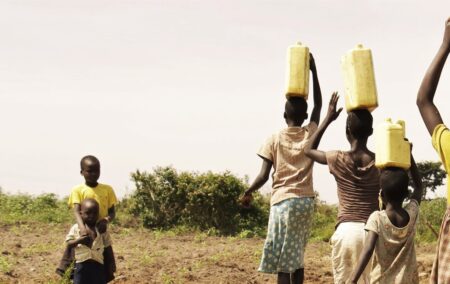In water, as elsewhere, failure to maintain or extend infrastructure means the cost of doing so is far beyond the capacity of the impoverished, and profligate, ANC government.
Last year the possibility that Cape Town might run out of water made news around the world. No sooner had drastic consumption cuts and the blessing of rain pushed ‘Day Zero’ into the future than the army had to be sent in to deal with major leaks of sewage into the Vaal River, which has been supplying water to South Africa’s industrial heartland since not long after gold was discovered.
Earlier this year Astral Foods, a big poultry producer, had to pump its own water from the Vaal because the municipality could not supply enough. And, of course, water problems in Grahamstown (now officially known as Makhanda) have been popping in and out of the news since 2013 at least. Johannesburg at the moment is subject to restrictions on water usage.
But for millions of people in villages all over the country, water shortages are part of daily life. Sometimes when water is available it is too contaminated to drink. Notoriously, at Bloemhof in North West province in 2014, possibly as many as 15 babies died when they drank filthy water. Elsewhere in the same year in the same province, in a township near Brits, four people died during protests against interruptions of their water supply.
Some of the people in Brits said the interruptions were deliberate, contrived by municipal officials wanting to generate business for friends who had turned themselves into water vendors. This, it appears, is a continuing problem. In April this year the minister of co-operative governance and traditional affairs, Zwelini Mhkize, voiced the suspicion that people in business with political links were sabotaging pipes in Vryburg so that they would then be called in by the municipality to bring in tankers to supply water. An ‘ANC source’ in Mpumalanga said infrastructure was deliberately neglected or tampered with so that there was a need for mobile distribution of water.
Thus does corruption percolate down from the very top levels of the state to some of the poorest communities. Thus does the municipal incompetence recently chronicled (yet again) by the auditor general hurt grass-roots South Africa. In water, as elsewhere, failure to maintain and/or extend infrastructure means that the cost of doing so is far beyond the capacity of the increasingly impoverished yet simultaneously increasingly profligate ANC government.
Because they have to buy water by the bucket, sometimes from people who bring it to them by wheelbarrow or donkey cart, some of these communities end up paying for water that government policy entitles them to receive for nothing. In villages in every one of the nine provinces of South Africa, taps frequently run dry and stay that way for months on end.
At the University of Cape Town some years ago students had the luxury of choosing to throw faeces at a statue of Cecil Rhodes. In towns and townships along the Vaal, and in villages elsewhere, faeces is not for fun but a hazard frequently present in the water supply.
Scrutiny of news reports shows that these problems occur so frequently as to be endemic. According to Statistics South Africa, just over 30% of South African households in 2017 said water was not safe to drink, not clear, not good in taste, or not free from bad smells.
Stats SA has reported that the number of households with access to piped water in their dwellings or outside or nearby, has risen from 8.94 million in 2002 to 14.36 million in 2017. Even so, this left more than 3 million people without access to a ‘basic water supply service’, while 14.1 million ‘do not have access to safe sanitation’.
Moreover, according to a report published towards the end of last year by the Department of Water and Sanitation (DWS), satisfaction with water and sanitation services has been ‘eroding steadily’. Citing Stats SA data from a 2016 community survey, DWS said that in 2005 some 76.4% of households regarded these services as good, but that this proportion had dropped to 63% by 2016. This was ‘lower than it was in 1994’.
The survey on which DWS reported had asked households to identify the ‘top five challenges’ facing their municipalities. Some 0.87 million households identified ‘violence and crime’, 1.20 million ‘inadequate housing’, 1.71 million ‘cost of electricity’, 1.96 million ‘lack of or inadequate employment opportunities’, and 2.68 million ‘lack of safe and reliable water supply’.
The DWS comments that access to water is a basic human right, and that access to sanitation ‘is a critical element in the right to dignity and to an environment not harmful to health or well-being’. Access to these services had improved ‘significantly’, but ‘reliability’ was ‘currently declining’. What a surprise!
Kane-Berman is a policy fellow at the IRR.
If you like what you have just read, become a Friend of the IRR if you aren’t already one by SMSing your name to 32823 or clicking here. Each SMS costs R1.’ Terms & Conditions Apply.


